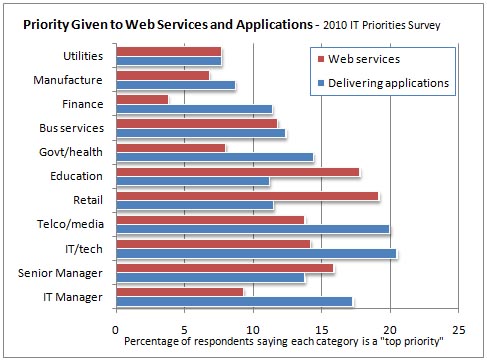IT managers shy away from web 2.0

Web 2.0 has transformed the use of web services, but IT managers seem only partially interested, particularly those in government.
You have to assume that ubiquitous high-speed internet — if the government manages to pull it off — will provide a whole new way for companies to interact with customers and for employees to collaborate. Yet web services ranks sixth in the pecking order of top challenges in this year's ZDNet IT Priorities survey, a long way behind such noble causes as protecting the network, ensuring business continuing, improving service responsiveness and controlling costs.
Once again we see a difference in the priorities of IT Managers and other senior managers — 15.9 per cent of senior managers said the development of web services was a top priority, compared with just 9.3 per cent of IT Managers.

The difference could, of course, be in the interpretation of the terminology. Senior managers might see web services as the delivery of web-based applications that can improve interactions with customers. That's presumably why education and retail are the two business sectors with the highest interest in the opportunity — almost 20 per cent of respondents made web services a top priority in the survey. This compares with just 8 per cent in the health and government sector, despite the publicity around the Government 2.0 initiative which, to date, seems like a lot of hot air.
When asked specifically about their interest in the relevance of new business applications based on web 2.0 techologies, just 7 per cent of respondents said it was a top interest, about half the interest in mobile working solutions.
Perhaps IT Managers are less excited about the emergence of web 2.0 services because they see it as a headache that conflicts with their number one priority of protecting their network. They are significantly more excited about the delivery of applications; presumably that means old-style proprietary applications. Smartphones are likely to be driving a lot of this, which is why more technology companies, telcos and the media are making this a top priority compared to other sectors. The delivery of applications ranked as the third-highest priority of IT Managers behind protecting the network and ensuring business continuity.
While developing applications can be fun and controllable, it's web 2.0 services that consumers are adopting en masse — remember there are 500 million active Facebook users. It's a phenomenon IT Managers cannot ignore. Companies need to interact through a myriad of channels and embrace open communications with their stakeholders. That has to be a challenge for every organisation, which makes you wonder why it ranks so far down the list. Shouldn't this be a high priority for everyone?
For those who would like to see the full report from the survey, please email Theresa Muzinda.